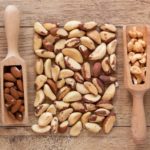
Bernadeth Atrinindarti
MAppSc (Advanced Nutrition Practice)
Over the last decade, there has been an increase in the number of studies, suggesting that reducing the consumption of animal products is beneficial for our health.
As a result, different types of vegetarian and vegan diets have steadily been increasing, and combining under one umbrella term, which is a plant-based diet.
Studies on plant-based diets have shown several health benefits, such as improvements in:
- Body mass index (BMI)
- Cardiovascular health
- Cancer risk
- Cognitive health
- Diabetes risk
- Gastrointestinal health
- Micronutrient intake
- Urinary health
This is great news. But, we have to look into more detail to see what kind of diets these studies were compared to.
Because in several studies that we looked into the term “omnivorous diet” meant either a “typical Western diet” or “Standard American diet (SAD)”.
How accurate is Nutrition Science
Nutrition science focuses on a particular organism’s response to certain diets.
A large majority of our beliefs of nutrition on mortality is based on epidemiological observational studies that are considered a cornerstone of nutrition science.
However, epidemiological observational studies are based on Food Frequency Questionnaire (FFQ), where participants are asked to share their dietary behaviour over a certain period of time, such as one month to one year ago.
Based on this data collection, and not actually controlling participants’ nutrition and intake of certain foods over a set amount of time, such studies provide conclusions that most of us take for granted.
The latest data on FFQ shows that there is an 82% overestimation in vegetable intake and 56% of fruit intake.
It’s important to be aware of these details before making sudden and large changes in our diet.
What is a plant-based diet?
The definition of a “plant-based diet” varies widely these days. While some define a plant-based diet as excluding all animal products, others emphasise a plant-based diet that focuses on nutrient-dense plant foods, with a small addition of animal-based protein and little to no processed foods.
Based on the 2021 study, a large majority of people see that a plant-based diet consists of all minimally processed:
- fruits
- vegetables
- whole grains
- legumes
- nuts
- seeds
- herbs
- spices
and excludes all animal products including:
- red meat
- poultry
- fish
- eggs
- dairy products
- honey[1]

A plant-based diet is seen by many as a vegan diet
RELATED — What is a plant-based diet: Vegan or Vegetarian?
A plant-based diet is known to be higher in fibre and lower in cholesterol, which have been associated with various health benefits, including reduced risk of heart disease, high blood pressure, type 2 diabetes, certain cancers and obesity.
They can also promote healthy weight management and improve overall well-being.[2]
However, it is important to consider that simply removing animal products from the diet does not guarantee a healthy plant-based diet.
Individuals on a plant-based diet need to plan their meals carefully and potentially consider supplements or fortified foods to ensure they meet their nutritional requirements.
What is an omnivorous diet?
An omnivorous diet includes a wide variety of foods from both plant and animal sources.
This includes fruits, vegetables, grains, legumes, nuts, seeds, meat, poultry, fish, dairy products, eggs, and sometimes even insects or other animal products.
Today, an omnivorous diet can be culturally and socially influenced, as different cuisines around the world often incorporate both plant-based and animal-based ingredients.
The flexibility of an omnivorous diet allows for a diverse range of nutrients and flavours. It can provide essential nutrients like:
- proteins
- carbohydrates
- fats
- vitamins (vitamin D and vitamin B complex)
- minerals (iron, calcium and zinc)
- omega-3 fatty acids
RELATED — Vitamin D: The sunshine hormone for stronger bones
While an omnivorous diet can offer a wide range of food choices and provide essential nutrients, there are also potential health risks associated with this dietary pattern.

Poorly balanced omnivorous diets high in saturated fats, cholesterol, and processed foods can increase the risk of certain health conditions.
These may include obesity, heart disease, high blood pressure, type 2 diabetes, certain cancers, and other chronic diseases.
Before we continue, it’s important to know that many of the studies that we looked into didn’t share what constituted “omnivorous diet”, and in several studies the term “omnivorous diet” meant either a “typical Western diet” or “Standard American diet (SAD)”.
For both of these diets, caloric intake of 30% – 60% is based on processed or ultra-processed foods.
For a healthy and balanced omnivorous diet, or any type of diet, it is crucial to prioritise nutrient-dense, whole foods and limit the consumption of unhealthy processed foods.
A healthy and balanced omnivorous diet would be identical to the Healthy Plate Model.
Diets, food choices and 8 health markers
Many nutritional studies rely heavily on food questionnaires as a means of data collection, forming the foundation of our understanding of dietary patterns and their impact on health.
Unlike controlled experiments where participants are closely monitored for extended periods, consuming specific types of food, most nutritional studies rely on self-reported data, which leads to biases and limitations.
Nutritional studies rely on food questionnaires
When it comes to our overall health there are specific health markers that we are interested in. These are:
- Body mass index (BMI)
- Cardiovascular health
- Cancer risk
- Cognitive health
- Diabetes risk
- Gastrointestinal health
- Micronutrient intake
- Urinary health
In this article, we will cover body mass index, cardiovascular health and cancer risk for both diets.
Body mass index (BMI)
Plant-based and omnivorous diets can be effective for weight management when approached with the principles of balanced nutrition, portion control, and overall energy balance.
A plant-based diet might be more beneficial compared to an omnivorous diet in terms of BMI or weight management since plant-based diets are typically high in dietary fibre, which can promote feelings of fullness and satiety.
High-fibre foods tend to have a lower energy density, meaning they provide fewer calories per volume compared to foods high in fats or sugars. This can help individuals feel satisfied with fewer calories, making it easier to manage portion sizes and control calorie intake.
A study by Kahleova et al. showed that participants following a plant-based diet resulted in significant reductions in BMI, body weight, fat mass and visceral fat volume compared to the control group.
Vegans have lower body mass index
The plant-based diet group was asked to follow a diet consisting of vegetables, grains, legumes and fruits and avoid animal products and added fats. The control group was asked to make no diet changes to their typical Western diet.[3]
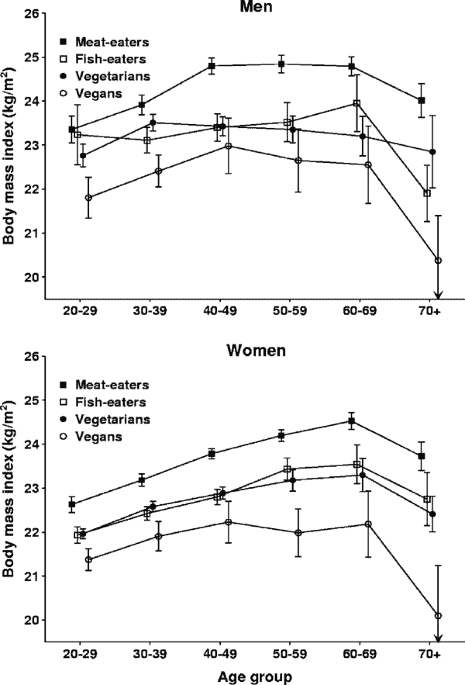
Source: Spencer, E., Appleby, P., Davey, G. et al. Diet and body mass index in 38 000 EPIC-Oxford meat-eaters, fish-eaters, vegetarians and vegans. (2003)
Another study by Jaceldo-Siegl et al. also resulted in lower BMI among participants following plant-based diets compared to the non-plant-based diet.
The plant-based diets group were classified into 5 including:
- vegans (never or rarely consume animal products)
- vegetarians (never or rarely eat meat or fish, and dairy >1 a month)
- pesco-vegetarians (never or rarely consumed meat, fish >1 per month, and no limits on dairy)
- semi-vegetarians (eat meat 1 per month-1 per week, no limits on dairy)
- non-vegetarian group ate meat and fish >1 per week with no limits on dairy.[4]
Furthermore, a study by Newby et al. reported that the prevalence of overweight or obesity (BMI > 25) was 40% among omnivores.
The study also showed that people with plant-based diets had a significantly lower risk of being overweight or obese than omnivores.[5]
Cardiovascular health
Over the years, plant-based diets have been shown to have numerous benefits for cardiovascular health. Several studies have indicated that a well-planned plant-based diet can help reduce the risk of developing cardiovascular diseases, including heart diseases and stroke.
Plant-based diets tend to be naturally low in saturated and trans fats, which are known to increase cholesterol levels in some people.
Moreover, plant-based diets are typically high in dietary fibre, which has several benefits for cardiovascular health. Fibre helps lower cholesterol levels by binding to cholesterol in the digestive system and preventing its absorption into the bloodstream.
Fibre helps lower cholesterol
Plant-based diets are also associated with lower blood pressure levels. The high potassium content found in many plant-based foods, such as leafy greens, bananas, and beans, has been linked to improved blood pressure regulation.
Additionally, the reduced sodium intake often associated with plant-based diets can help further lower blood pressure.
A study conducted in Brazil was analysing the cardiovascular risk in people with a plant-based diet and an omnivorous diet. The results showed that the total cardiovascular risk points were significantly higher in the omnivore group compared to the plant-based group.[6]
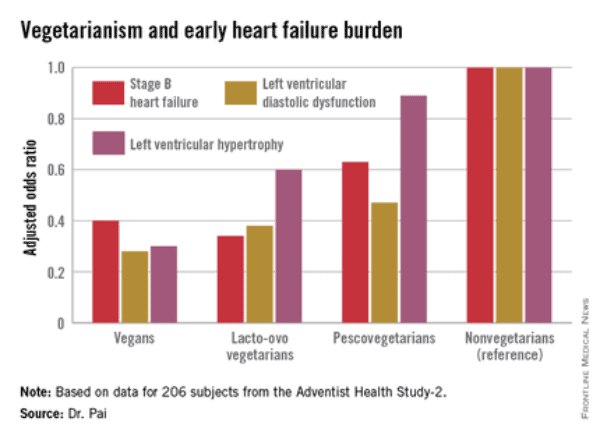
Another study reported that individuals following a plant-based diet had lower total cholesterol and LDL cholesterol by 20% and 25% respectively compared to the non-plant-based individuals.[7]
This study was done in Finland where there is a steep increase in consumption of processed foods (omnivorous diet), with ultra-processed foods consisting of 30% of caloric intake.
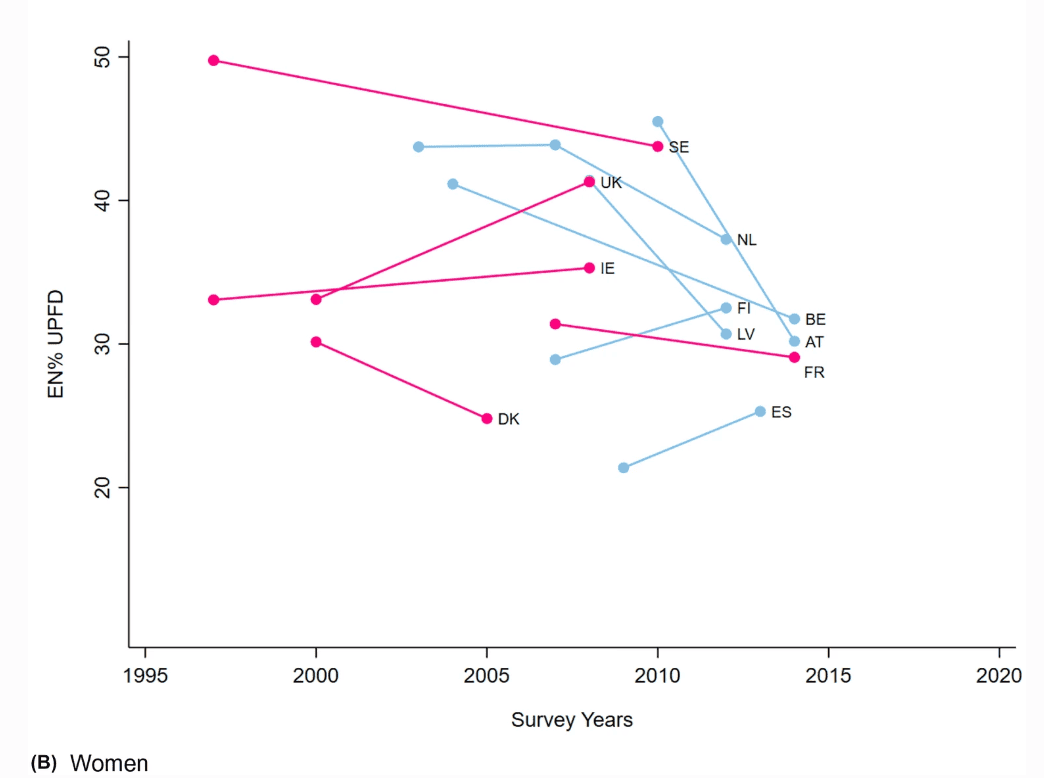
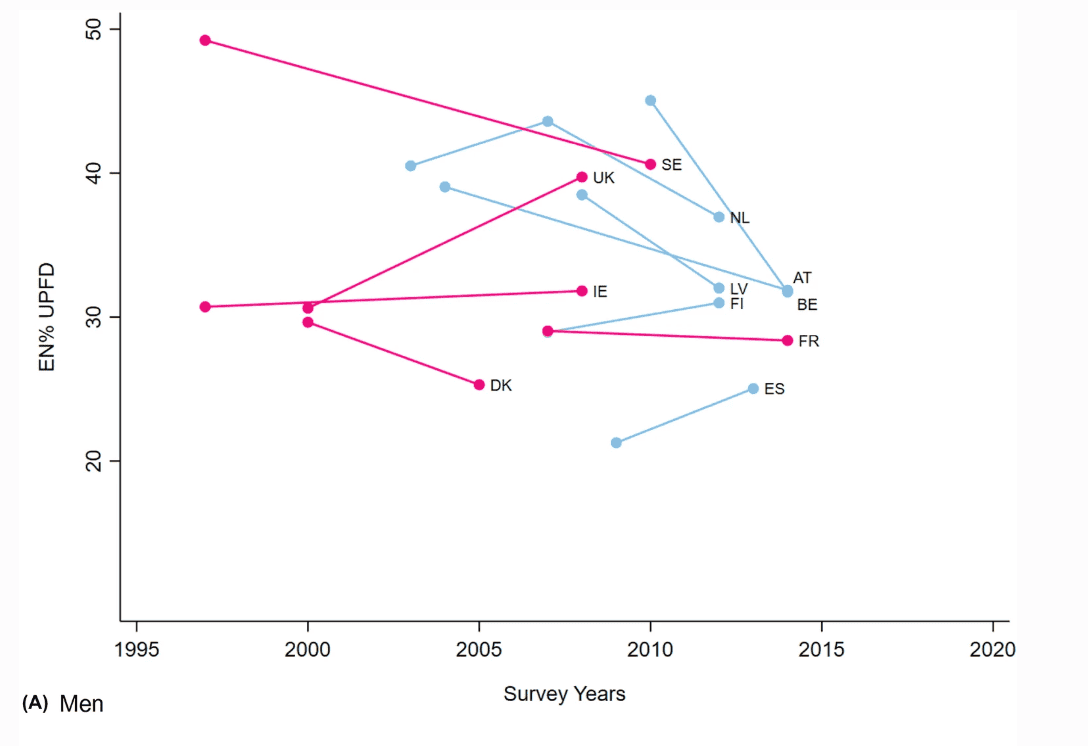
Time-changes of the dietary energy share from ultra-processed foods and drinks in the European adult population, with recurrent dietary survey intake data available by EFSA, stratified by sex and method of dietary assessment.
Legend: 24-h recalls (blue line); Food records (red line). EN% energy percentages. UPFD ultra-processed foods and drinks. AT Austria, BE Belgium, DK Denmark, ES Spain, FI Finland, FR France, LV Latvia, IE Ireland, NL the Netherlands, SE Sweden, UK United Kingdom.
Source: Mertens, E., Colizzi, C. & Peñalvo, J.L. Ultra-processed food consumption in adults across Europe. Eur J Nutr 61, 1521–1539 (2022)
Another study observed the effect of a plant-based diet on the risk factor for cardiovascular disease. The result reported that there was a significant decrease in LDL cholesterol by 8% after a 24-week of following a plant-based diet.[8]
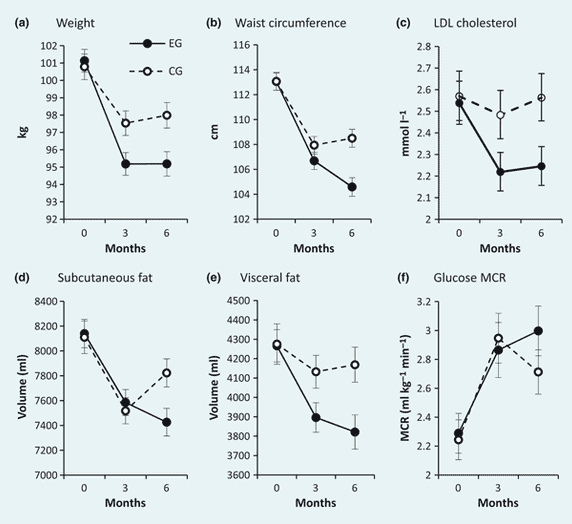
EG = Experimental group, CG = Control group.
A study by Zugravu et al. conducted a study on a group of 38 plant-based individuals who have adopted the diet for at least one year. The result showed that individuals with high low-density lipoprotein cholesterol (LDL-c) levels succeeded in normalising them.
Additionally, the study also reported reduced total cholesterol which is a well-known predictor for heart disease risk and lower values mean better cardiovascular health.[9]
Cancer risk
Plant-based diets have been associated with a reduced risk of certain types of cancer compared to omnivorous diets.
Plant-based diets usually involve lower consumption or complete avoidance of processed meats and red meats, which have been linked to an increased risk of colorectal and other cancers.
This might also be due to the preparation of meat including when meat is cooked at high temperatures or exposed to flames. This can result in the exposure of two main carcinogens: heterocyclic aromatic amines (HCAs) and polycyclic aromatic hydrocarbons (PAHs).[10]
These two carcinogens can cause changes in DNA that may increase the risk of cancer. The World Health Organisation has classified processed meats as carcinogenic to humans, and red meats as probably carcinogenic.
Grilling might contribute to risk of cancer
Furthermore, plant-based diets provide a higher intake of dietary fibre and antioxidants. Fibre helps promote regular bowel movements and reduces the time potential carcinogens come in contact with the colon.
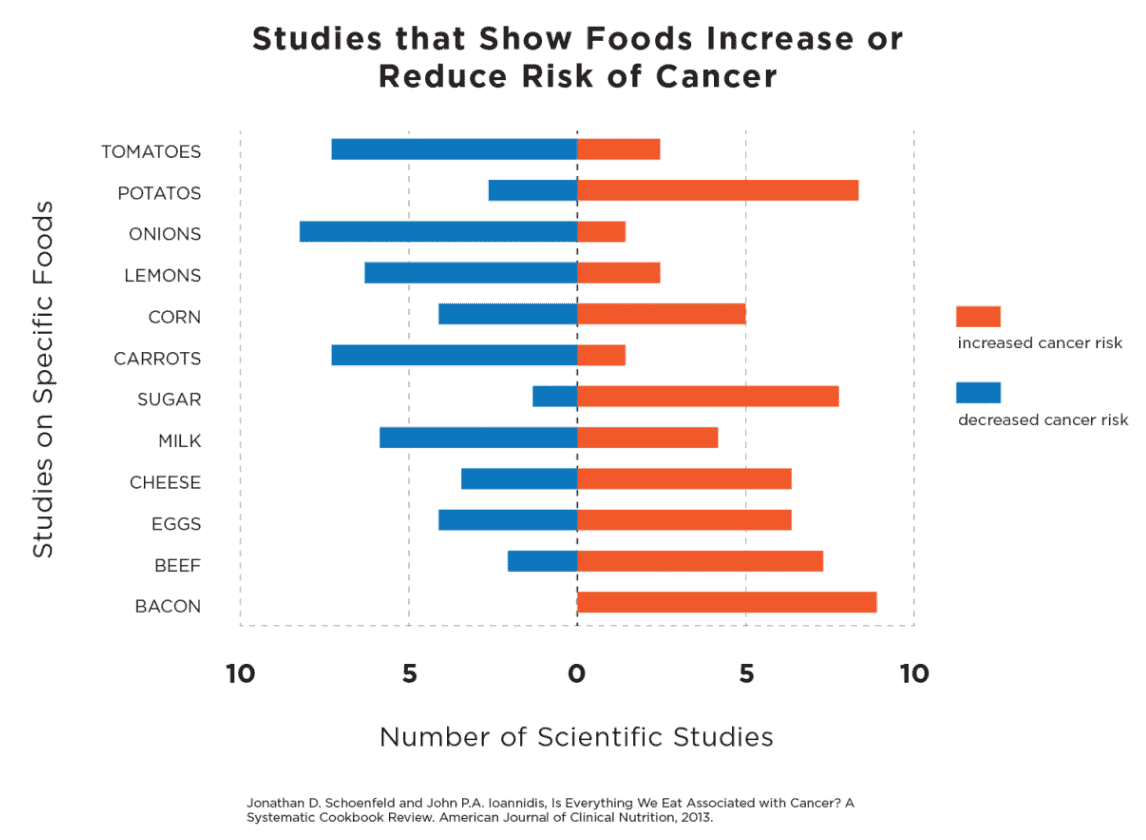
Plant-based diets are abundant in phytochemicals, which are bioactive compounds found in plants. These compounds have been shown to possess anti-inflammatory, antioxidant, and anti-cancer properties.
RELATED — Anti-cancer foods: The Healthiest Herbs and Spices (Part 1)
Current research from Oxford Population Health’s Cancer Epidemiology Unit (CEU) analysed data to investigate the relationship between diet and cancer risk.
Compared to people with a plant-based diet, regular meat eaters had a higher risk of developing any type of cancer. The study also found 18% less risk of postmenopausal breast cancer in plant-based eaters compared to meat eaters.[11]
A study by Loeb et al. observed the effect of plant-based diets on individuals with prostate cancer. The result showed that greater consumption of healthful plant-based foods is associated with a lower risk of aggressive forms of prostate cancer.[12]
Another study indicated that men who followed a healthful plant-based diet associated a 59% lower risk of prostate cancer recurrence. Furthermore, they also had a 56% lower risk of prostate cancer progression.[13]
RELATED — Prostate Cancer: All you need to know and are afraid to ask
However, further research is still needed to determine the relationship between diet and cancer risk.
A healthy and balanced omnivore diet that emphasises a variety of vegetables, lean proteins and minimally processed food can provide essential nutrients and potentially reduce the risk of certain types of cancer.
Related Questions
1. What are the immediate benefits of a plant-based diet?
The bowel movements become more regular after eating a whole plant-based diet, and there might be a decrease in cholesterol levels.
2. How much processed or ultra-processed food does an omnivore diet consist of?
The amount of processed or ultra-processed food in an omnivore diet can vary depending on individual food choices, dietary habits, and part of the world.
Current data and research suggest that in some countries such as the US, processed and ultra-processed foods contribute up to 60% of daily calories.
3. Would an omnivore diet be the same as the Standard American Diet (SAD)?
A healthy omnivore diet refers to a dietary pattern that includes both plant-based foods and animal-based foods.
On the other hand, the Standard American Diet (SAD) is characterised by:
- high consumption of processed foods
- refined grains
- added sugars
- unhealthy fats
while often lacking in fruits, vegetables, whole grains and other nutrient-dense foods.
Currently, most dietary studies do not mention what foods are present in an “omnivorous diet group”, which makes “omnivorous diet” a synonym for the Standard American Diet (SAD).
4. Are plant-based diets high in oxalates, and what are the top 3 foods with the highest amount of oxalates?
Certain foods that are staples of vegan or plant-based diets are high in oxalates which can cause kidney stones to develop.
Foods high in oxalates are:
- Spinach
- Soy products (tofu, soymilk)
- Beets
5. Can an oxalate-rich diet lead to osteoporosis?
Oxalates are compounds found in certain plant foods that bind to calcium as they leave the body. Over time, this can cause calcium loss and poorer bone mineral density.
However, there is still limited evidence that an oxalate-rich diet directly leads to osteoporosis.
What kind of diet are you currently enjoying, and how much of it is based on processed or ultra-processed foods?
Bernadeth’s passion in cooking, food and health led her to learn more about nutrition and the importance of functional foods. Throughout the years, she gained special interest in sports and performance nutrition, and the varieties of diets around the world. As a nutritionist, Bernadeth’s goal is to encourage a healthy-balanced diet and share the evidence-based nutrition knowledge in order for people to live healthier and longer lives.
Bernadeth is a part of the Content Team that brings you the latest research at D’Connect.
References
(1) Storz, M.A. What makes a plant-based diet? A review of current concepts and proposals for a standardised plant-based dietary intervention checklist. Eur J Clin Nutr 76, 789–800 (2022). Retrieved from https://doi.org/10.1038/s41430-021-01023-z
(2) Brown, J. (2020). Are there health benefits to going vegan? The Vegan Factor. Retrieved from https://www.bbc.com/future/article/20200122-are-there-health-benefits-to-going-vegan
(3) Kahleova, H., Tura, A., Hill, M., Holubkov, R., & Barnard, N. (2018). A Plant-Based Dietary Intervention Improves Beta-Cell Function and Insulin Resistance in Overweight Adults: A 16-Week Randomised Clinical Trial. Nutrients, 10(2), 189. MDPI AG. Retrieved from http://dx.doi.org/10.3390/nu10020189
(4) Jaceldo-Siegl K, Estevez D, Fraser GE, et al. Plant-Based Diets in Hispanic/Latino Adult Adventists in the United States and Their Association With Body Mass Index. American Journal of Health Promotion. 2019;33(6):869-875. doi:10.1177/0890117119828285
(5) Newby, P. K., Tucker, K. L., & Wolk, A. (2005). Risk of overweight and obesity among semi-vegetarian, lacto-vegetarian, and vegan women 2, 3. The American Journal of Clinical Nutrition, 81(6), 1267-1274. doi:https://doi.org/10.1093/ajcn/81.6.1267
(6) Teixeira, R.deC., Molina, M.delC., Zandonade, E., & Mill, J. G. (2007). Cardiovascular risk in vegetarians and omnivores: a comparative study. Arquivos brasileiros de cardiologia, 89(4), 237–244.
(7) Elorinne, A. L., Alfthan, G., Erlund, I., Kivimäki, H., Paju, A., Salminen, I., Turpeinen, U., Voutilainen, S., & Laakso, J. (2016). Food and Nutrient Intake and Nutritional Status of Finnish Vegans and Non-Vegetarians. PloS one, 11(2), e0148235. Retrieved from https://doi.org/10.1371/journal.pone.0148235
(8) Kahleova, H., Matoulek, M., Malinska, H., Oliyarnik, O., Kazdova, L., Neskudla, T., Skoch, A., Hajek, M., Hill, M., Kahle, M., & Pelikanova, T. (2011). Vegetarian diet improves insulin resistance and oxidative stress markers more than conventional diet in subjects with Type 2 diabetes. Diabetic medicine : a journal of the British Diabetic Association, 28(5), 549–559. Retrieved from https://doi.org/10.1111/j.1464-5491.2010.03209.x
(9) Zugravu, C. A., Otelea, M. R., Vladareanu, R., Grigoriu, C., Salmen, T., Manolache, F. A., & Bohiltea, R. E. (2022). The Effect of Plant-Based Nutrition Diets on Plasma Lipids Profile—A Study Case in Romania. Sustainability, 14(2), 1008. MDPI AG. Retrieved from http://dx.doi.org/10.3390/su14021008
(10) Do grilled foods cause cancer? (2023). Retrieved from https://www.cuimc.columbia.edu/news/do-grilled-foods-cause-cancer#:~:text=Grilling%20can%20create%20 cancer%2d Causing,increase%20the%20 rise%20of%20 cancer
(11) Watling, C.Z., Schmidt, J.A., Dunneram, Y. et al. Risk of cancer in regular and low meat-eaters, fish-eaters, and vegetarians: a prospective analysis of UK Biobank participants. BMC Med 20, 73 (2022). Retrieved from https://doi.org/10.1186/s12916-022-02256-w
(12) Stacy Loeb and others, Association of plant-based diet index with prostate cancer risk, The American Journal of Clinical Nutrition, Volume 115, Issue 3, March 2022, Pages 662–670. Retrieved from https://doi.org/10.1093/ajcn/nqab365
(13) Fuerst, Mark L.. Plant-Based Diet May Lower Risk of Prostate Cancer Progression. Oncology Times 45(6):p 17, March 20, 2023. | DOI: 10.1097/01.COT.0000923928.34214.00




